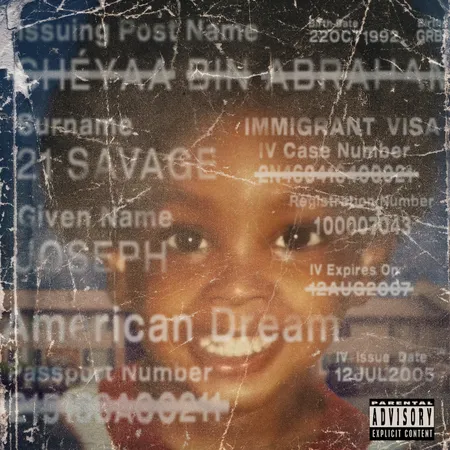
On Jan. 12, 2024, 21 Savage released his third studio album “american dream.” The cover art depicts a young Savage and his visa information layered over. Having recently received his green card after years of struggle, Savage discusses personal perspective on his life and career, rather than what has been portrayed in the media regarding his immigration journey.
“american dream” serves as a personal account of the issues many poverty-stricken Americans face. Although accompanied with explicit themes, haunting beats and questionable lyrics, 21 Savage’s latest record serves as his most aware and introspective work to date.
Starting with the intro track, “american dream” serves as a spoken word by Savage’s mother, Heather Carmilla Joseph, where she discusses her reasons behind immigrating. Like many immigrants, Joseph’s recounting of the incident provides a warming and selfless story many U.S. immigrants face to provide a better living and well-being for their children.
“Forever confronting whatever transitions that needed to be endured / To make his position as a winner more secured / For my son to become a man and live free in his American dream,” Joseph says.
Title track “american dream” sets the outline for the album going onward, transitioning masterfully into the song “all of me.” “all of me” fades into a soulful and triumphant sample flip by Rose Royce and the song “wishing on a star,” discussing the violence that shaped Savage’s character.
“letter to my brudda” covers tales of difficult upbringings. Apart from his own, Savage discusses the fight for survival in a bad neighborhood with little opportunity that many friends, family and minorities have to endure. Narratively serving as a letter to his brother in jail, Savage closes the song displaying the unfortunate living conditions of poverty many are handed in life. Not only speaking to his brother, Savage speaks to the listeners enduring through the same pain by providing relatability.
“And sometimes we be forced to make decisions that we don’t even wanna make / It be about survival / At the end of the day, we be havin’ good hearts / They just be in bad places,” Savage raps.
Additionally on “letter to my brudda,” Savage continues to pay his respect to a childhood friend, Johnny Taylor, who was brutally shot in the head due to gun violence. Having rapped about Taylor in other songs, such as J.Cole’s “my life,” Savage continues to retell Taylor’s story as a reminder of gun control and violence that continues to poison America.
“Hard work, tryna keep the past behind me / I still be havin’ flashbacks ’bout Johnny,” Savage raps.
On the album’s closing track “dark days,” Savage discusses the dangers of living a hood lifestyle. Rather than glorifying violence, Savage discusses a life of fulfillment that can be reached by living a traditional lifestyle to the younger generation.
“You gon’ lose a lot of your friends and that’s what hurt the most / You can’t do nothin’ but reminisce about y’all crackin’ jokes / You feelin’ like nobody love you, I know how that go,” Savage raps.
Featuring Mariah The Scientist, Scientist displays emotional vocal inflections on the songs’ chorus that countbalance Savage’s words of wisdom. Although rapping about his well-earned success in achieving his American Dream, Savage lets his audience know that even with found accomplishments, one can still feel at their lowest.
“Never do no suicide / But I’d be lyin’ if I said it hadn’t crossed my mind / I hurt on the inside and I still act like I’m fine,” Savage raps.
Joseph returns to close the album out with a few words of aspiration for her son and the audience, pleading that in the end, dreams do come true. “american dream” entails the stories of heartbreak, injustice and the most emotionally present 21 Savage has been with his life experiences and incorporating them into his music. Although with questionable explicit lyrics, Savage delivers a one of a kind iteration of the immigrant story and the American Dream.

